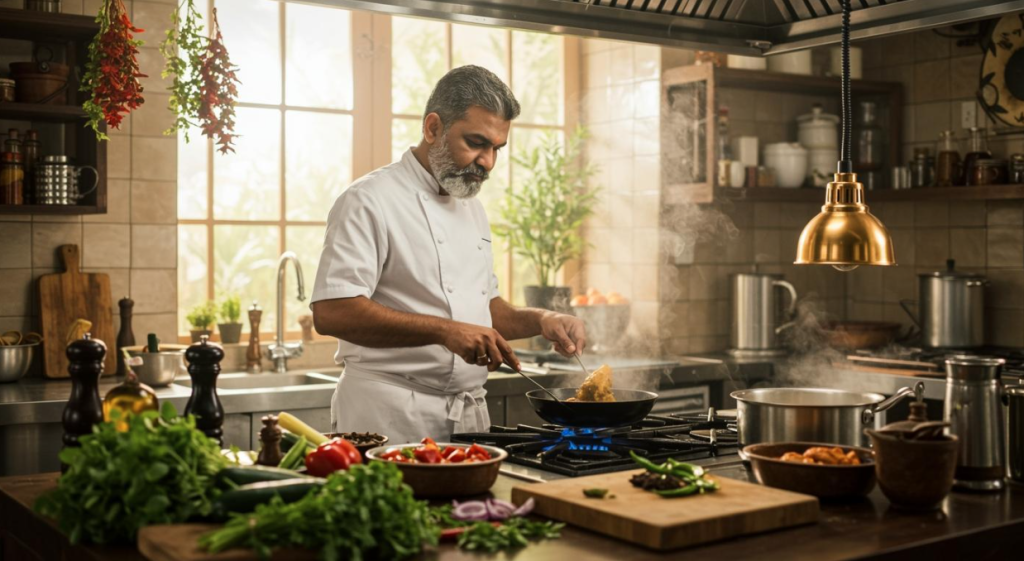Celebrity chef Ayesha Nallaseth stood in her kitchen in April, demonstrating something that might surprise traditional Indian cooks: swapping regular cooking oil for virgin coconut oil while making besan ladoo. Her partnership with QNET India launched the company’s #HealthyCookingFirst campaign on World Health Day, targeting urban households hungry for healthier cooking methods.
The campaign centers on a simple premise: small changes in cooking ingredients can create meaningful health improvements. Urban Indian households buy roughly 25 million tons of edible oil each year, and their purchasing patterns have shifted noticeably toward premium alternatives.
QNET India’s focus product, Nutriplus Virgin Coconut Oil, contains Medium Chain Triglycerides that the company markets as a heart-friendly alternative to conventional cooking oils.
“Our commitment to well-being goes beyond just offering quality products – it’s about building a lifestyle rooted in awareness, conscious choices, and balance,” said Nischal C, head of corporate communications for QNET India region. “With #HealthyCookingFirst, we aim to inspire healthier cooking habits starting from the most essential ingredient – oil. Nutriplus Virgin Coconut Oil is a testament to our focus on natural, sustainable, and nutrition-first solutions.”
Teaching Urban Cooks New Tricks
Walk into any metropolitan household today and you’ll likely find multiple cooking oils: sunflower for everyday use, mustard for specific dishes, maybe olive oil for salads. Now add coconut oil to that mix, not just for South Indian recipes but for everyday cooking.
About 25% of Indian households use sunflower oil as their go-to cooking medium, while coconut oil usage stays concentrated in certain regions. QNET wants to change those numbers by showing northern Indian families how coconut oil works in their traditional recipes.
Chef Nallaseth’s demonstration videos make this point clearly. She doesn’t ask people to abandon their food culture. Instead, she shows how virgin coconut oil can enhance familiar dishes while adding nutritional benefits.
Metro Households Face Growing Food Challenges
Urban Indian eating patterns reveal troubling trends. Sweet snacks, salty snacks, and cooking oils now rank among the fastest-growing food categories in city households, raising concerns about increased sugar, salt, and fat consumption. Meanwhile, lifestyle diseases like diabetes and cardiovascular problems climb steadily in metropolitan areas.
QNET’s broader nutrition line acknowledges these challenges head-on. The Nutriplus range includes clinically tested products designed specifically for urban lifestyles, where convenience often trumps nutrition. Company research from 2024 found growing consumer demand for products that blend traditional Indian ingredients with modern health science.
Take coconut oil’s MCT content, for example. These medium-chain triglycerides are thought to support metabolism and provide quick energy, benefits that appeal to busy urban professionals juggling work stress and irregular meal schedules. The oil also works for cooking, baking, and personal care, offering the multipurpose functionality that time-pressed city dwellers value.
But QNET doesn’t promise overnight transformations. They emphasize gradual dietary improvements that actually stick, recognizing that urban families appreciate practical solutions that work with existing cooking habits.
Building a Complete Nutrition Ecosystem
Metropolitan areas in India have seen 95% growth in demand for organic and health-focused food products over five years. QNET’s Nutriplus line tackles multiple dietary gaps that plague city households through targeted supplementation and functional foods.
Nutriplus DailyHealth packs 13 essential vitamins and 10 minerals into supplements. The formula includes blue-green algae from Oregon’s Lake Klamath, providing bioavailable nutrients that support cellular health and energy production.
Urban sugar consumption presents another challenge. Nutriplus Natose Stevia offers natural sweetening without the calories, backed by research from KU Leuven University showing stevia’s role in taste perception and insulin response. City families can maintain traditional sweet dishes while reducing refined sugar intake.
Immune support is crucial for urban professionals facing pollution, stress, and crowded environments. Nutriplus ImmunHealth combines papaya leaf extract, Echinacea, zinc, and magnesium to address these stressors.
Is QNET Illegal in India?
QNET operates legally in India through Vihaan Direct Selling, its registered sub-franchisee that maintains compliance with direct selling guidelines established by the Ministry of Consumer Affairs. The company holds a valid Corporate Identification Number under the Companies Act, 2013 and continues operations under Supreme Court protection granted in 2017. Regulatory oversight ensures nutrition messaging meets established standards for health and wellness communications in urban markets.
The #HealthyCookingFirst campaign reflects broader industry trends toward ingredient transparency and consumer education as competitive advantages. Urban markets reward companies that provide genuine educational value alongside product offerings, especially when targeting health-conscious demographics that prioritize informed decision-making over price alone.
Whether educational campaigns can effectively drive adoption of premium cooking ingredients in cost-conscious urban markets remains an open question. Early engagement metrics suggest appetite for nutrition education, but sustained behavior change requires more than awareness. QNET’s long-term success will depend on whether their educational approach translates into lasting cooking habit changes among urban Indian families.



